
 i_need_contribute
i_need_contribute

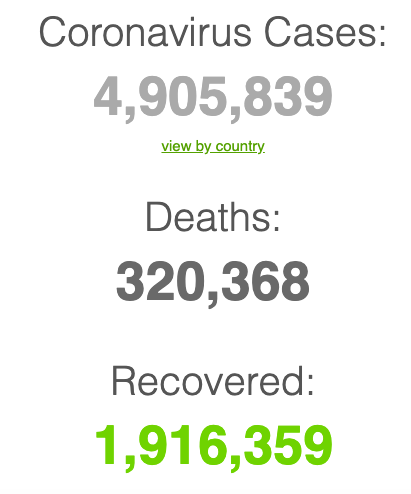

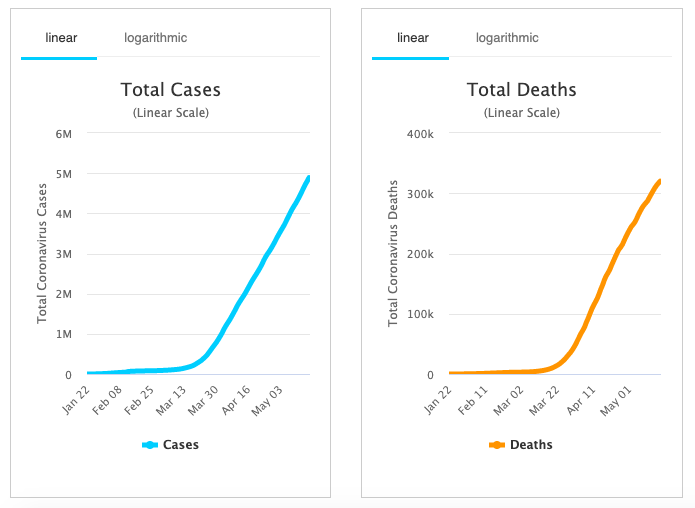
|
Country, |
Total |
New |
Total |
|
World |
4,888,124 |
+88,858 |
319,965 |
|
1,550,294 |
+22,630 |
91,981 |
|
|
290,678 |
+8,926 |
2,722 |
|
|
278,188 |
+469 |
27,709 |
|
|
255,368 |
+14,288 |
16,853 |
|
|
246,406 |
+2,711 |
34,796 |
|
|
225,886 |
+451 |
32,007 |
|
|
179,927 |
+358 |
28,239 |
|
|
177,289 |
+638 |
8,123 |
|
|
150,593 |
+1,158 |
4,171 |
|
|
122,492 |
+2,294 |
7,057 |
|
|
100,328 |
+4,630 |
3,156 |
|
|
94,933 |
+2,660 |
2,789 |
|
|
82,954 |
+7 |
4,634 |
|
|
78,072 |
+1,070 |
5,842 |
|
|
57,345 |
+2,593 |
320 |
|
|
55,559 |
+279 |
9,080 |
|
|
49,219 |
+2,075 |
5,177 |
|
|
46,059 |
+2,278 |
478 |
|
|
44,141 |
+146 |
5,694 |
|
|
42,125 |
+1,974 |
903 |
|
|
33,969 |
+1,365 |
15 |
|
|
33,582 |
+400 |
2,799 |
|
|
30,597 |
+10 |
1,886 |
|
|
30,572 |
+922 |
171 |
|
|
30,377 |
+234 |
3,698 |
|
|
29,209 |
+173 |
1,231 |
|
|
28,343 |
+305 |
22 |
|
|
24,200 |
+88 |
1,547 |
|
|
24,190 |
+832 |
224 |
|
|
23,870 |
+1,602 |
349 |
|
|
18,885 |
+356 |
936 |
|
|
18,616 |
+325 |
535 |
|
|
18,010 |
+496 |
1,191 |
|
|
17,036 |
+165 |
1,120 |
|
|
16,643 |
+26 |
276 |
|
|
16,433 |
+918 |
286 |
|
|
16,305 |
+20 |
749 |
|
|
16,295 |
+721 |
592 |
|
|
16,269 |
+27 |
629 |
|
|
15,691 |
+841 |
118 |
|
|
12,764 |
+535 |
645 |
|
|
12,725 |
+411 |
434 |
|
|
12,718 |
+205 |
831 |
|
|
11,065 |
+15 |
263 |
|
|
10,968 |
+41 |
548 |
|
|
10,699 |
+89 |
231 |
|
|
9,606 |
+157 |
275 |
|
|
8,586 |
+111 |
297 |
|
|
8,371 |
+303 |
382 |
|
|
8,257 |
+8 |
233 |
|
|
7,201 |
+182 |
555 |
|
|
7,184 |
+228 |
12 |
|
|
7,072 |
+408 |
173 |
|
|
7,060 |
+15 |
99 |
|
|
6,952 |
+82 |
192 |
|
|
6,941 |
+47 |
113 |
|
|
6,440 |
+283 |
35 |
|
|
6,380 |
+33 |
300 |
|
|
6,175 |
+216 |
191 |
|
|
6,138 |
+78 |
217 |
|
|
5,735 |
29 |
||
|
5,379 |
+193 |
25 |
|
|
4,823 |
+351 |
61 |
|
|
4,088 |
+262 |
169 |
|
|
3,947 |
+2 |
107 |
|
|
3,554 |
+150 |
127 |
|
|
3,535 |
+26 |
462 |
|
|
3,529 |
+424 |
140 |
|
|
3,387 |
+113 |
40 |
|
|
3,031 |
+3 |
56 |
Source : https://www.worldometers.info/coronavirus/
From The New York Times
As Germany broke with decades of economic orthodoxy to align with France in proposing a $545 billion European relief fund, and as China pledged $2 billion to fight the pandemic, the United States escalated its threats of isolationism, pledging to permanently end funding for the World Health Organization unless it committed to “substantive improvements within the next 30 days.”
President Trump’s defunding threat, detailed in a letter he posted to Twitter on Monday night, came after a World Health Organization meeting that was supposed to chart a global path to combat the coronavirus pandemic. Instead, the meeting turned into a showcase for the escalating tensions between China and the United States, and illustrated the American desire to pull away as other world leaders were working in concert.
In a move that could catapult China to the forefront of international efforts to contain the coronavirus, President Xi Jinping of China announced at the start of the forum that Beijing would donate $2 billion toward fighting the coronavirus and dispatch doctors and medical supplies to Africa and to countries in the developing world. The gesture was also seen — particularly by American officials — as an attempt by China to forestall closer scrutiny of whether it hid information about the outbreak.
The donation, to be divvied out over two years, amounts to more than twice what the United States had been giving the global health agency before President Trump cut off American funding last month. Last year, the United States contributed about $553 million of the W.H.O.’s $6 billion budget.
The Trump administration has sought to blame the organization for the spread of the virus, which has killed more than 315,000 people worldwide, including more than 90,000 in the United States. In videotaped remarks to the assembly after Mr. Xi spoke, Alex M. Azar II, the U.S. secretary of health and human services, countered with sharp criticism of both the W.H.O. and China, saying their handling of the outbreak led to unnecessary deaths.
In an unmistakable reference to China, he said, “In an apparent attempt to conceal this outbreak, at least one member state made a mockery of their transparency obligations, with tremendous costs for the entire world.”
As the United States discussed pulling back from international obligations, Germany’s agreement to back the idea of collective European debt represented a major philosophical shift that could lead to a more unified Europe. Faced with economic calamity and the threat of the coronavirus further fracturing the bloc, Chancellor Angela Merkel of Germany joined with President Emmanuel Macron of France to propose borrowing 500 billion euros, or $545 billion, for a common recovery fund.
Its repayment would be the financial responsibility of the entire bloc, but it would primarily benefit the poorer south, which has been hit hardest by the virus. Such a joint approach to borrowing has long been resisted by Germany and other member states in the north, and that reluctance has proved an obstacle to further European integration.
Southern states have been turning to Brussels for help and pushing better-off countries like Germany and the Netherlands for greater collective action. In countries like Italy, where many feel abandoned by their neighbors, anti-European and populist sentiment has spiked markedly.
Mujtaba Rahman, chief European analyst for the Eurasia Group, said, “It’s a European revolution — if it goes through.”
Although the proposal represents a significant shift in German thinking, Ms. Merkel described it as a “one-off effort,’’ with Germany agreeing to a plan whereby the European Commission, using its excellent credit rating, would borrow money for the fund. The debt would be paid back over time through the joint European Union budget, which is financed by a set formula by member states.
From The New York Times
Relatives carried the coffin of a coronavirus victim to a cemetery in the north of Guayaquil, Ecuador, last month.Credit...Jose Sanchez Lindao/Agence France-Presse — Getty Images
Six weeks after the devastating peak of the coronavirus outbreak in Ecuador, dozens of bodies remain unidentified as families continue searching for deceased relatives whose bodies were misplaced during the chaotic period.
The authorities are still trying to establish the identities of about 90 bodies that were collected from homes in the port city of Guayaquil, which suffered the worst of the pandemic, according to the president’s emergency envoy to the city, Jorge Wated.
The city used to see about 45 deaths a day, on average, but during the peak of the outbreak in early April, that number jumped to 600 daily deaths, he said. The number overwhelmed hospitals and morgues.
Overall, about 7,600 more people died in Ecuador from March 1 to April 15 than the average for that time period in recent years, according to an analysis of the official mortality data by The New York Times. Most of the excess deaths occurred in the city of Guayaquil, a bustling city of three million where the spike in mortality was comparable to what New York City experienced at the peak of the pandemic.
As bodies piled up, authorities in Guayaquil lost the ability to record deaths and bury the victims.
One Guayaquil man received the ashes of his dead mother and later discovered that her body was buried in a cemetery. And a local woman returned to her family, alive, after being pronounced dead by health officials.
Elizabeth Narváez has been looking for the body of her brother-in-law, Luis Fernando Yépez, a Guayaquil bus driver, since last seeing him at a hospital on March 30. He died the next day with coronavirus symptoms.
After scouring hospitals, cemeteries and the local forensics office, officials told her they found a body that appears to match Mr. Yépez, but it is now too decomposed to identify it by fingerprints. She now has to wait for the results of a DNA test, which could take weeks.
“It has been a real calvary,” said Ms. Narváez. “Not even animals are treated the way the government has treated the bodies.”
From The New York Times

A protest organized by members of the far-right Alternative for Germany party against the government coronavirus policies in Berlin last week.Credit...Emile Ducke for The New York Times
Even as Germany is celebrated as Europe’s foremost example of pandemic management, an eclectic protest movement that began last month with a few dozen people marching against coronavirus restrictions has ballooned into more than 10,000 demonstrators in cities across the country.
The driving force behind the mobilization is the country’s far right, particularly the Alternative for Germany party, or AfD, which had been marginalized by the pandemic as Germans rallied behind Chancellor Angela Merkel and the government’s social distancing restrictions.
Now, the AfD’s leaders see the protests as a first step toward moving back into the national conversation, using the demonstrations to position their message for the months ahead, when Germany must confront job losses and a battered economy.
“The crisis is coming, it isn’t here yet,” said Nicolaus Fest, head of Berlin’s AfD chapter, who was protesting near the Brandenburg Gate on Saturday. “Some time soon, a lot of people will be unemployed.”
Alongside anti-vaxxers, anticapitalists and ordinary citizens concerned about job losses and safety at reopened nurseries and schools, the marches have attracted neo-Nazis, hooligans and, consistently, members of the AfD, a party best known for its noisy nationalism and anti-immigrant views.
For now, despite the noise they make, the protesters remain a small minority. A recent survey found that two in three Germans are satisfied with the government’s response to the crisis. Six out of 10 say they are not worried if certain freedoms have to be curtailed for longer.
But the European Commission expects the German economy to shrink by 6.5 percent this year, the worst performance since World War II. The AfD’s popularity, which early on in the crisis slumped below 10 percent, has begun to edge up.
From The New York Times

Celtic F.C. fans celebrated outside Celtic Park in Glasgow after the team was declared the champion of the Premiership. The season was cut short with eight games remaining.Credit...Jeff J Mitchell/Getty Images
England and Scotland have a long rivalry on and off sports fields. But ultimately, they are both part of Britain and the United Kingdom. So it may come as a surprise to see how differently they are approaching the return of soccer.
England has been doing everything it can to restart its season. Players will return to training in small groups on Tuesday. No date for games is yet set, but organizers are eager to begin as soon as feasibly possible.
But Scotland announced Monday that its season would not continue. Celtic F.C., which was leading the Premiership by 13 points with eight games remaining, was declared the champion for the ninth straight year.
One reason for the discrepancy between England and Scotland’s plans is money. England has a huge TV deal — worth more than a billion dollars per year, domestically alone. If England failed to finish its season, it would have to give back a portion of the money, and even a portion is still a ton of cash.
Scotland’s TV deal is much smaller, less than $20 million domestically, according to reports. But Scotland is getting a better deal next season, and no one wants to jeopardize that income. So calling it a season and moving on to a more lucrative future seemed to be the soundest move.
The other two nations in the U.K., Wales and Northern Ireland, with leagues even smaller than Scotland’s, have not yet made decisions on whether to try to resume their seasons.
From The New York Times
Turkey will impose a four-day lockdown across the country, starting on Saturday, to curb the spread of the coronavirus during the religious holiday of Eid al-Fitr, when Muslims typically gather in large family groups to celebrate.
In a televised address on Monday, President Recep Tayyip Erdogan announced the nationwide lockdown, the most severe restriction Turkey has imposed in the pandemic. Mr. Erdogan said most Turkish citizens would be forbidden from going out into the streets.
Turkey has one of the largest outbreaks in the world, with more than 149,000 reported cases of the coronavirus and more than 4,100 deaths, and those numbers may be underestimates. The country has imposed some social restrictions since mid-April, but only in major cities.
The virus has already disrupted the ability to worship together for many Muslims, especially during the past month as Ramadan was being observed. At revered sites in Mecca and Medina, for example, communal prayers were banned.
One of the two most important religious festivals for Muslims, Eid al-Fitr is a celebration that marks the end of Ramadan. In Turkey, a Muslim-majority country with a population of 83 million, people usually enjoy the Eid with visits to extended families, where hugging is common, as is kissing the hands of elderly people as a sign of respect.
From The New York Times
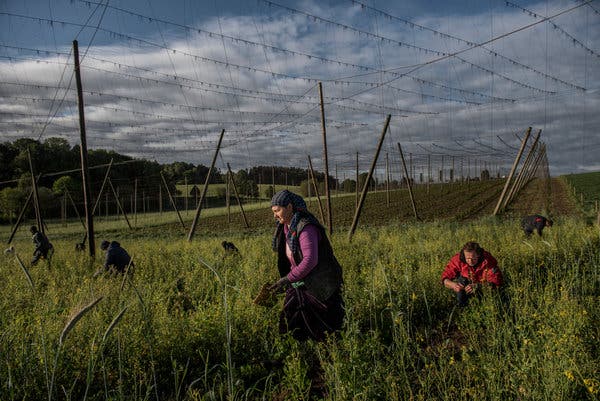
Florian Bogensberger, right, in his fields with seasonal workers. Mr. Bogensberger said he spent more than 10,000 euros to fly in 23 Romanian workers.Credit...Laetitia Vancon for The New York Times
In a normal season, as many as 300,000 migrant workers from Eastern Europe make their way to Germany to harvest asparagus, pick strawberries and plant late-season crops.
But just as the first harvest was to begin, Germany and its neighbors to the east slammed shut their borders to contain the coronavirus, cutting off a crucial supply of farm labor and putting crops at risk.
The German government has responded by allowing farmers to airlift workers from Romania and Bulgaria. The farmers must organize and pay for charter flights, and the program was capped at 40,000 workers a month in April and May.
The move has eased the labor shortage, but not solved it. The cost and logistical challenges have meant that only about 28,000 workers have been flown in so far, well short of the number needed. It has also raised concerns about importing new infections and exploiting vulnerable workers.
Florian Bogensberger, a farmer in Bavaria’s Hallertau region, said he spent more than 10,000 euros, about $11,000, to fly in 23 Romanian workers. Though it meant pushing back other needed investments, he said the flight was worth it.
“Everybody feels a bit scared,” said Gabriel Moraru, 47, a Romanian who has done seasonal work at the Bogensberger farm for the past decade. “But we also need to work.”
From journalist Abir Mahmud in Bangladesh, Esha Mitra in New Delhi, and Ben Westcott
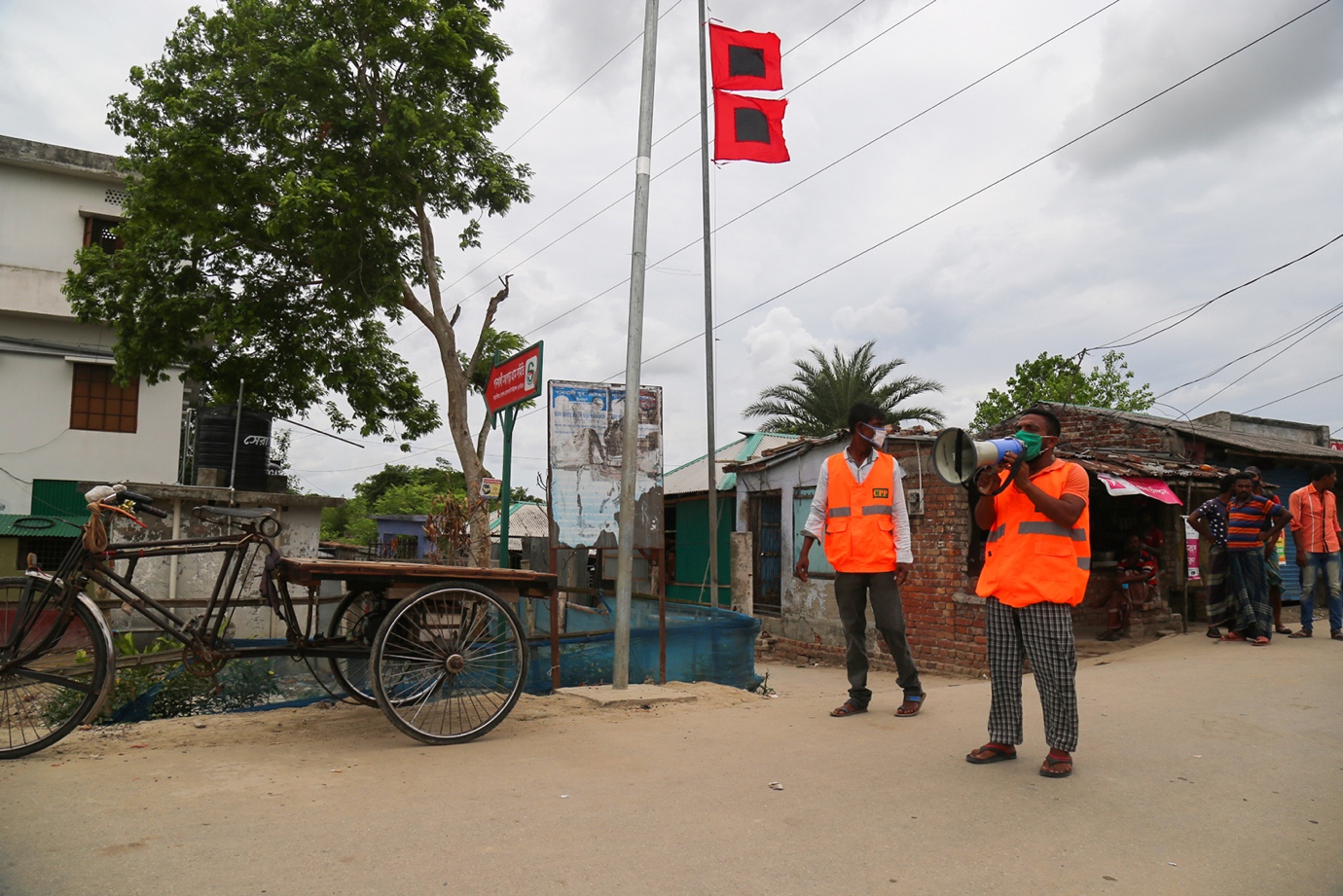
A volunteer uses a megaphone to urge residents to evacuate to shelters ahead of the expected landfall of Super Cyclone Amphan in Khulna, Bangladesh on May 19. Kazi Shanto/AFP/Getty Images
Bangladeshi officials are planning to evacuate some 2 million people along coastal areas as the country braces for Super Cyclone Amphan.
In India, officials said up to 300,000 people in the coastal areas of West Bengal and Odisha are in immediate danger from the storm and may also need to be evacuated.
The senior information official for the Disaster Management Ministry said Bangladesh has the capacity to move 9.1 million people to safety in cyclone shelters while assuring Covid-19 social distances measures are followed. So far 5,000 people have already moved to shelters in two districts ahead of the storm.
"We have prepared more than 12,000 cyclone shelters to evacuate coastal villages. The number is more than doubled in comparison to the last cyclone. We are initially aiming to move some 2 million people to these safely,” Bangladesh disaster management junior minister Enamur Rahman said on Tuesday.
Pradeep Jena, special relief commissioner for India's Odisha State, said emergency services had to balance saving lives from the cyclone with savings lives from the coronavirus.
"Social distancing is definitely a very good concept but enforcing it in the strictest possible manner in a disaster situation may not always be possible," he said.
From CNN's Eric Cheung in Hong Kong
Australia's Qantas group released new guidelines for passengers traveling onboard its planes, in preparation for eased travel restrictions, according to a statement on Tuesday.
From June 12, passengers check in will be contactless, while hand sanitizer will be provided at check-in and departure gates.
While onboard, passengers will be provided with face masks. The statement says wearing a mask is not mandatory -- just recommended to give everyone peace of mind.
Passengers will board and disembark in sequences to minimize crowding. They will also be provided with sanitizing wipes to use in flight.
"Qantas and Jetstar aircraft are already fitted with hospital-grade HEPA filters, which remove 99.9% of all particles including viruses. Air inside the cabin is refreshed on average every five minutes during flight," the statement added.
From CNN's Elizabeth Cohen
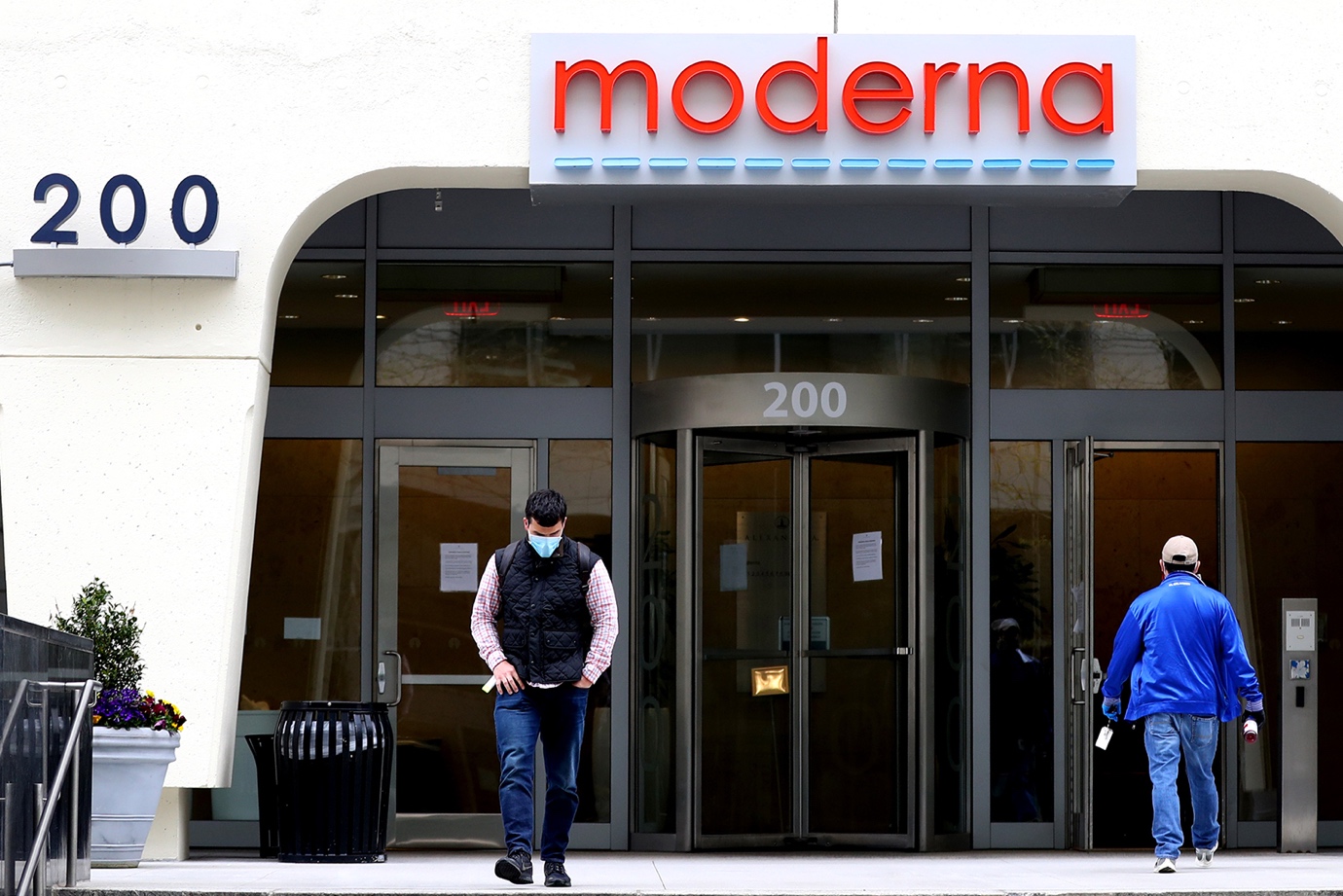
A view of Moderna headquarters on May 8, in Cambridge, Massachusetts. Moderna was recently given FDA approval to continue to phase 2 of a coronavirus vaccine trials with volunteers. Maddie Meyer/Getty Images
Volunteers who received Moderna's Covid-19 vaccine had positive early results, according to the biotech company, which partnered with the National Institutes of Health to develop the vaccine.
If future studies go well, the company's vaccine could be available to the public as early as January, said Moderna's chief medical officer, Dr. Tal Zaks.
"This is absolutely good news and news that we think many have been waiting for for quite some time," Zaks said.
These early data come from the phase 1 clinical trial, which typically studies a small number of people and focuses on whether a vaccine is safe and elicits an immune response.
The results of the study, which was led by the National Institutes of Health, have not been peer reviewed or published in a medical journal.
Moderna, based in Cambridge, Massachusetts, is one of eight developers worldwide doing human clinical trials with a vaccine against the novel coronavirus, according to the World Health Organization. Two others, Pfizer and Inovio, are also in the United States, one is at the University of Oxford in Britain, and four are in China.
Moderna has vaccinated dozens of study participants and measured antibodies in eight of them. All eight developed neutralizing antibodies to the virus at levels reaching or exceeding the levels seen in people who've naturally recovered from Covid-19, according to the company.
Neutralizing antibodies bind to the virus, disabling it from attacking human cells.
"We've demonstrated that these antibodies, this immune response, can actually block the virus," Zaks said. "I think this is a very important first step in our journey towards having a vaccine."
From CNN's Shasta Darlington
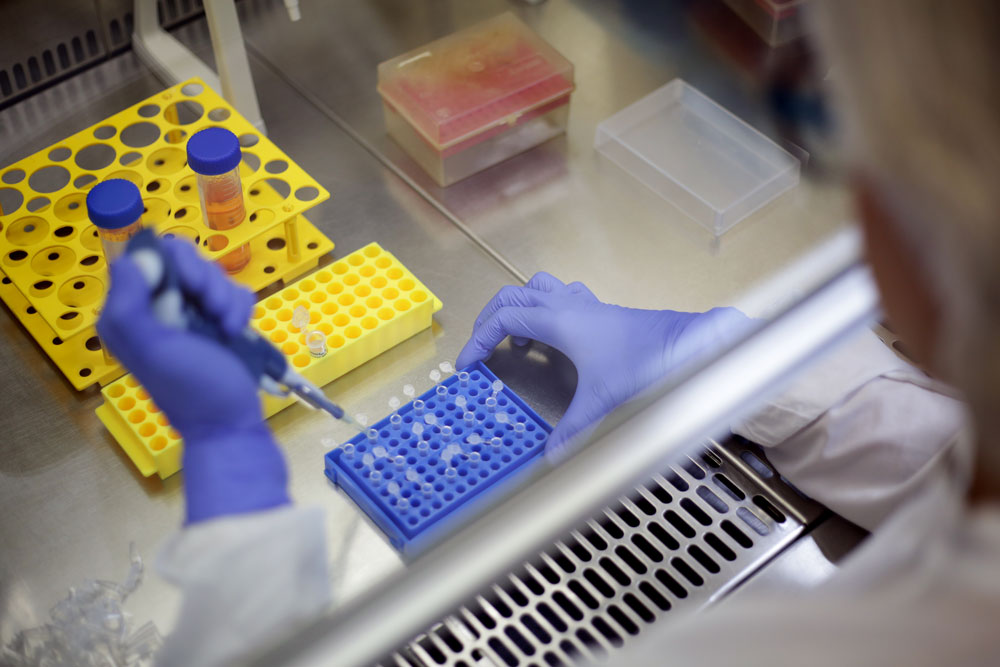
A researcher works on a coronavirus testing program in Rio de Janeiro on April 1. Andre Coelho/Getty Images
Brazil topped 250,000 coronavirus cases on Monday, surpassing the UK's total and making it the country with the third highest number of global confirmed infections.
Brazil's Ministry of Health also reported 674 new deaths Monday, bringing the death toll in the country to 16,792.
The ministry also reported 13,140 new cases of the novel coronavirus in the 24-hour period between Sunday and Monday, bringing the country's total to 254,220, behind the US and Russia.
Some background: Brazilian President Jair Bolsonaro has faced criticism for his anti-lockdown rhetoric even as cases skyrocket. He has repeatedly dismissed Covid-19 as a "little flu" and urged businesses to reopen, even as many governors scramble to implement social isolation measures and slow the spread of the virus.
Bolsonaro also recently saw a second health minister leave his government in the span of a few weeks.
Source:https://edition.cnn.com/world/live-news/coronavirus-pandemic-05-19-20-intl/index.html
Global cases pass 4.8 million. There are 4,805,005 confirmed coronavirus cases worldwide, according to Johns Hopkins University data. The death toll stands at 318,534. US deaths, the highest worldwide, passed 90,000, and the number of cases climbed above 1.5m, according to the Johns Hopkins University tracker.
Trump threatens to make WHO funding freeze ‘permanent’. Late on Monday evening, Donald Trump tweeted a letter addressed to World Health Organization director general Tedros Adhanom Ghebreyesus saying that if the WHO “does not commit to major substantive improvements within the next 30 days, I will make my temporary freeze of United States funding to the World Health Organization permanent and reconsider our membership of the organization”. The letter does not detail what the improvements are.
WHO chief promises review of coronavirus response. Before Trump’s letter was released, the World Health Organization said on Monday that an independent review of the global coronavirus response would begin as soon as possible . A resolution drafted by the European Union calling for an independent evaluation of the WHO’s performance appeared to have won consensus backing among the WHO’s 194 states. The motion is expected to be voted on on Tuesday.
Trump says he is taking hydroxychloroquine. After the US president told reporters at the White House that he has been taking hydroxychloroquine, his doctor released a letter confirming that they had discussed the use of the drug and “concluded the potential benefit from treatment outweighed the relative risks”. A White House spokesperson told the New York Times that Trump was prescribed the drug and is taking it. The US Food and Drug Administration has cautioned against use of hydroxychloroquine or chloroquine for Covid-19 outside of a hospital setting or a clinical trial due to risk of heart rhythm problems.
Brazil cases overtake UK to become third-highest worldwide. The number of confirmed coronavirus cases in Brazil stands at 255,368, according to Johns Hopkins University figures, making the country the third-worst affected in terms of cases.There are 16,792 officially confirmed deaths in Brazil, which is lower than the UK, Italy, Spain and France.
IMF chief says full economic recovery unlikely in 2021. The global economy will take much longer to recover fully from the shock caused by the new coronavirus than initially expected, the head of the International Monetary Fund said, and she stressed the danger of protectionism. Managing director Kristalina Georgieva said the IMF was likely to revise downward its forecast for a 3% contraction in GDP in 2020, but gave no details. That would likely also trigger changes in the fund’s forecast of a partial recovery of 5.8% in 2021.
Deaths in Australia reach 100. The death toll in Australia has reached 100, following the death of a 93-year-old woman who had been diagnosed with Covid-19.The woman had been a resident at Newmarch House, the care home in western Sydney that has been the site of a cluster of cases.
India cases pass 100,000. The number of confirmed cases in India has passed 100,000, standing at 100,328 according to Johns Hopkins University figures.The country has recorded 3,156 deaths. The government this week extended a nationwide lockdown to the end of May, but with significantly reduced restrictions, including allowing markets and standalone shops can reopen from Monday, with social distancing measures. Inter and intra-state road travel resumed with the agreement of states, but air travel, both domestic and international is still banned.